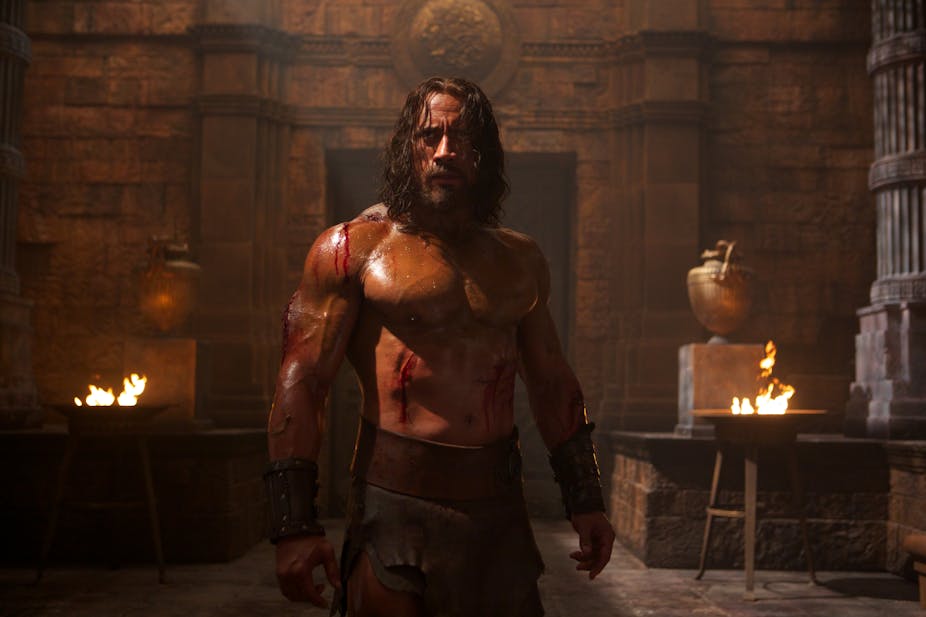Who wants to be Hercules? Judging by the huge amount of internet interest in the diet and fitness regime of Dwayne “The Rock” Johnson, former professional wrestler and star of the latest Hercules film, the answer seems to be almost every male from the age of 14 to 30.
Certainly, if the demographic of the audience for the Hercules screening that I attended is at all indicative, the appeal of the hero is broad. We were a diverse bunch. Some geeky, some sporting the latest fashions. Some thin and reedy, others looking like they could have been Dwayne’s body double. As a group, we cut across ethnic and class divisions.
The only thing that we had in common was that we were almost all men.
And we were hungry. I’ve never been at a film where so much food was put away. It was a good thing that the soundtrack was loud enough to drown out the sound of rustling chip packets, crunching popcorn, and the crack of choc-tops. Yet it seems appropriate that the arrival of the latest incarnation of this hero should have been welcomed by a chorus of consumption because it is through food that we have the best chance of imitating Hercules.
We live in the age of protein. Thanks to revolutions in the commercial production of meat combined with the presence of relatively cheap shakes, powders, and bars, we can now consume protein in a purity and density that is historically without parallel. The Greeks used to marvel at the thought of a hero consuming a side of beef. These days all it takes is a trip to the “health food” section of the supermarket aisle.

Looking like Hercules is now a possibility for more men than at any other point in human history. Previously, there was something freakish about bodybuilding figures. When Eugen Sandow, the father of modern bodybuilding, demonstrated his physique at West Point, cadets placed their hands on his pectorals as they “danced” in time with the music of a marching band.
They had never seen a body like it and they definitely never imagined themselves inhabiting such a torso.
Now that opportunity is within our grasp and the consequences of this profound revolution are something that we need to tackle. With the possibility of looking like Hercules comes burdens and anxieties. Incidents of body image problems among adolescent boys continue to rise. Psychiatrists are seeing increasing cases of “bigorexia”, a term coined to describe the variety of psychological problems associated with the pressure to look muscular.
Teachers are reporting escalating problems with steroid abuse at schools. Ordering diet supplements seems to have replaced pornography as man’s favourite illicit online activity.

All of this would have surprised and confused the Greeks. When they carved their statues, they knew they were fantasies. They represented ideals that could never be attained.
Look closely at a Greek statue and you’ll see the fantasy unravel before your eyes. The muscles are often unnaturally grouped. Pectorals hang without the abdominals to support them. Lines are carved in the marble with only a cursory attempt to replicate underlying anatomy.
Thanks to an ab-blaster anybody with dedication and 3% body fat can look like the front of the Greek statue. But I defy anybody to achieve a back like a Greek statue, where preconceptions about symmetry all too often mean that muscles are found in impossible combinations or abdominal lines don’t fade out at the hips as they do in nature, but actually continue round to meet the spine.
We are also rather selective about how we admire Greek statues. I know a number of men who’ve expressed a desire to have the stomach of a Greek statue. But I know no man who has wanted to have the genitals of a Greek statue. Like Jacqui Lambie, we seem to prefer things to come in slightly bigger packages.

It is a shame that Hercules has come to represent nothing but a pile of muscles for us. The fad for imitating Hercules is not a new one. From antiquity onwards emperors, generals, Renaissance princes, and French kings have attempted to appropriate Hercules’ mantle for themselves.
Yet, in all these cases, it wasn’t his body they were imitating, but his virtues. It was his courage, his fortitude, his preference for a life of struggle and pain instead of an easy comfortable existence that they admired.
One of the significant advances in this latest Hercules film is that Hercules is now accorded an inner life. He is not a mindless thug. The bloodshed and carnage that he leaves in his wake comes at a cost.
He is plagued by guilt for his actions. The black dog that snaps at his heels is depression, not Cerberus. When Hercules begs the Gods to let him be a good husband and father, he touches on a profound truth.
That seems to me the real challenge of being man, not how to achieve a six-pack.

